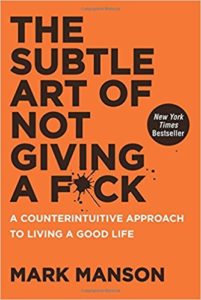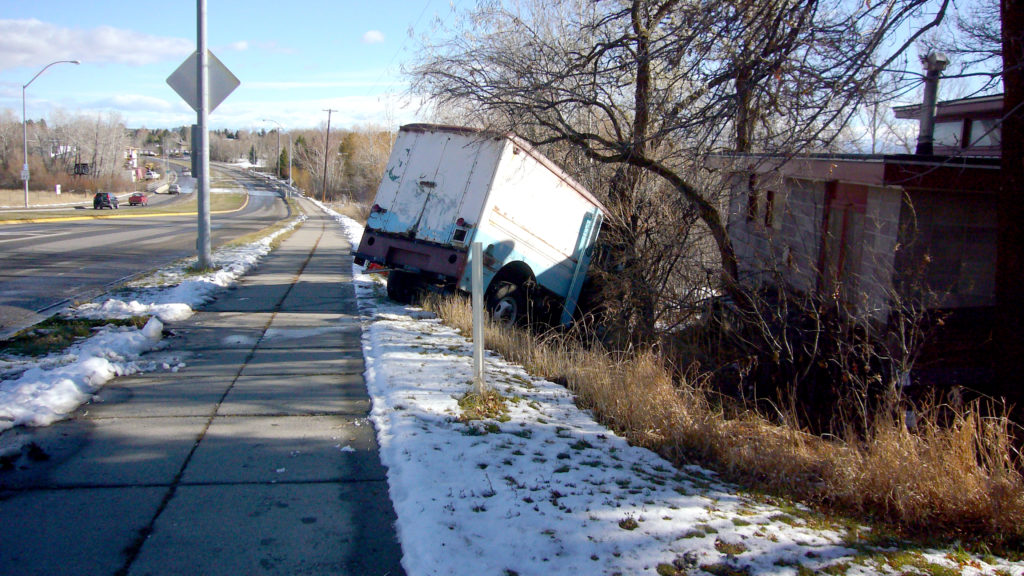Who is to blame when a team loses? Who is at fault? Without seeing any part of the game I can tell you that both of those questions are less important than figuring out who is responsible. So, are you going to take responsibility? Should you?
Difference between Responsibility and Fault
 I just finished reading a very interesting book titled, “The Subtle Art of Not Giving a F*ck” by Mark Manson and he has a chapter about the difference between Responsibility and Fault. It is a concept that I have encountered before but it is something that is not always easy to remember … or build into your everyday life.
I just finished reading a very interesting book titled, “The Subtle Art of Not Giving a F*ck” by Mark Manson and he has a chapter about the difference between Responsibility and Fault. It is a concept that I have encountered before but it is something that is not always easy to remember … or build into your everyday life.
“The responsibility/fault fallacy allows people to pass off the responsibility for solving their problems to others.”
– Mark Manson
In sports, there is always someone to blame. The key, especially for the players and the coaches, is to recognize your own responsibility because until you accept responsibility it is nearly impossible to improve. When you don’t take responsibility, you are saying that there is nothing that you can do to change your current or future situations and that is simply not true.
This concept extends far beyond the field or the court. In relationships, careers, and personal development, understanding the difference between responsibility and fault is crucial. It’s easy to fall into the trap of blaming external circumstances or other people for our failures. However, embracing responsibility, even when a situation is not our fault, empowers us to take control of our reactions and our future.
Consider a business leader who faces a sudden market downturn. They could blame the economy, competitors, or myriad other factors outside their control. While these might not be their fault, the responsibility to adapt and guide the company through the storm remains squarely on their shoulders. Taking responsibility does not mean accepting blame for things out of one’s control; it means recognizing the power to respond, adapt, and grow.
In everyday life, we can practice recognizing the difference between fault and responsibility by reflecting on our reactions to challenges. Ask yourself, “Is this situation my fault? Maybe not. But what can I do to respond in a way that aligns with my goals and values?” By focusing on our ability to take charge rather than getting entangled in assigning fault, we free ourselves to learn, adapt, and thrive. It’s not just a path to personal growth; it’s a journey towards empowerment and a fulfilled life. In the words of Wayne Dyer, “All blame is a waste of time. No matter how much fault you find with another, it will not change you.” Focus on what you can change—yourself.
Blame: The Trap of Victims
Blame shifts the focus from personal control to outside forces. It’s a way of relieving ourselves of the burden of personal responsibility but at the cost of losing control over our own lives. Blame can hinder growth, trapping us in a cycle of victimhood. When we engage in blame, we relinquish our power to change our situation, handing it over to circumstances or others.
However, blame is not inherently bad. In some situations, recognizing external factors can be part of the healing process. But lingering in blame can create a mindset where progress is stunted, and opportunities are missed. The difference lies in whether blame is used as a stepping stone to understanding or as a barrier to personal growth.
A Story of Redemption: Consider the example of Malala Yousafzai. After surviving an assassination attempt by the Taliban for advocating for girls’ education, she could have blamed her circumstances, her country, or the political climate. Instead, she took responsibility for her mission, turning her experience into a platform for global education advocacy. Rather than falling into victimhood, she used her circumstances to fuel a movement that changed the lives of millions of girls worldwide. Her story is a testament to the transformative power of responsibility over blame.
John C. Maxwell’s words ring true in Malala’s story and many others: “A man must be big enough to admit his mistakes, smart enough to profit from them, and strong enough to correct them.” Blame might provide a temporary salve for our ego, but taking responsibility can turn a moment of weakness into a lifetime of strength and purpose.
Embracing responsibility over blame is a choice with profound implications. It’s not just a path to personal growth; it’s a journey towards empowerment, fulfillment, and true leadership. In the words of Viktor Frankl, a survivor of the Holocaust, “When we are no longer able to change a situation, we are challenged to change ourselves.” How will you respond to that challenge today? The road to empowerment awaits.
No Decision is still a decision
Even if you do nothing, you are still making a decision. You have decided to do nothing and let the situation continue in whatever direction it might go. As we know, small problems grow into big problems, so doing nothing is rarely a good choice… but it is always your choice (even if you don’t believe it).
The paradox of inaction can be both comforting and alarming. On one hand, it emphasizes the control and autonomy you have in every situation. On the other, it reminds you that passivity is not a refuge but a choice with its consequences. This realization should not breed fear but inspire mindfulness in our decisions, whether active or passive.
In many ways, the decision to do nothing is a missed opportunity. It’s the road not taken, the chance not seized, the potential not realized. It can often be the product of fear, uncertainty, or a sense of inadequacy. But as author and motivational speaker Tony Robbins once said, “The only limit to your impact is your imagination and commitment.” Imagine the possibilities that open up when you decide to take control and make deliberate choices.
Sometimes, the most potent action starts with the decision not to accept the status quo. If you find yourself inclined to do nothing, ask yourself: What is holding me back? What do I fear? What opportunities might I discover by choosing to act? Remember, every step forward begins with the decision to move, to change, to grow.
Consider a real-life example: Rosa Parks’ refusal to give up her seat on a bus was, in a sense, a decision to do nothing—to not comply with an unjust system. Yet that simple act of “doing nothing” became a catalyst for a movement that transformed a nation. Your choices, no matter how small or seemingly insignificant, carry the potential to make waves.
No decision is void of consequence. The choices we make—or don’t make—shape our lives, our communities, and our world. Embrace the power and responsibility of choice. Whether to act or not to act is indeed a significant decision, one that requires courage, reflection, and wisdom. As you move forward, remember the words of Mahatma Gandhi: “The future depends on what you do today.” So what will you choose to do, or not do, today?
Even if you do nothing, you are still making a decision. You have decided to do nothing and let the situation continue in whatever direction it might go. As we know, small problems grow into big problems so doing nothing is rarely a good choice… but it is always your choice (even if you don’t believe it).

